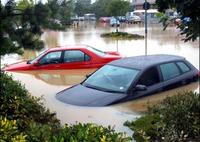-
New research to improve protection and recovery from major floods

As parts of the United Kingdom suffer further flooding with more heavy rain forecast, three research projects funded by the Engineering and Physical Sciences Research Council (EPSRC) could radically change the way U.K. government and local authorities prepare for and respond to floods, mitigating future risks
-
-
Fire risks to increase in some regions of the world
Climate change is expected to disrupt future fire patterns around the world, with some regions, such as the western United States, seeing more frequent fires within the next thirty years; at the same time, fire activity could actually decrease around equatorial regions, particularly among the tropical rainforests, because of increased rainfall
-
-
Floating dock from Japan carries potential invasive species
When debris from the 2011 earthquake and tsunami in Japan began making its way toward the West Coast of the United States, there were fears of possible radiation and chemical contamination as well as costly cleanup; a floating dock that unexpectedly washed ashore in Newport, Oregon, earlier this month, and which has been traced back to the Japanese disaster, has brought with it a completely different threat — invasive species
-
-
Deadly Italy earthquakes result in $6 billion economic loss
Two earthquakes and subsequent aftershocks struck northern Italy within a 9-day period, killing twenty-five people, injuring more than 400 others and causing extensive damage to the cultural heritage throughout the Emilia-Romagna region of Italy, in addition to businesses and personal property; prolonged periods of rain affected China throughout the month of May, with at least 143,000 homes damaged or destroyed
-
-
ISO offers new standard for business continuity management
Incidents take many forms ranging from large scale natural disasters and acts of terror to technology-related accidents and environmental incidents; the International Organization for Standardization (ISO) has published an international standard addressing business continuity management to contribute making organizations in both public and private sectors more resilient
-
-
Private, public partners in Illinois CBRN emergency drill
First responders and authorities in Lake and Cook counties, Illinois, joined Army Reserve units to conduct Exercise Red Dragon 2012, a chemical, nuclear response exercise
-
-
NASA to operate unmanned aircraft over hurricanes this year
Beginning this summer and over the next several years, NASA will be sending unmanned aircraft dubbed “severe storm sentinels” above stormy skies to help researchers and forecasters uncover information about hurricane formation and intensity changes
-
-
Simulating the effects of different actions to minimize disaster’s consequences
The European CRISMA project prepares for disasters by developing a decision-support tool to help the authorities, responders, communities, and private parties to prioritize the most important measures for saving lives and mitigating the effects of the crisis
-
-
California coastal planners protect infrastructure from climate change
California’s coastal planners and resource managers say there is a need to prepare for changes along the coast that might result from rising sea levels and other impacts, such as more floods, loss of beach access, coastal erosion, and potential damage to transportation infrastructure, including highways, roads, and ports
-
-
Baseball players support relief efforts in Japan
Major League baseball players continue their support of earthquake and tsunami relief efforts in Japan by awarding a $310,000 grant from the Players Trust to expand mobile Community Café to serve as a cultural hub to help restore a sense of community to areas devastated by last year’s twin disasters
-
-
Using Twitter to share information after a disaster
A new study shows how people used Twitter following the 2011 nuclear disaster in Japan, highlighting challenges for using the social media tool to share information; the study also indicates that social media have not changed what we communicate so much as how quickly we can disseminate it
-
-
IBHS: Don’t let a disaster put you out of business
Insurance institute urges small business owners and managers to prepare for risks that could threaten their operations
-
-
New law allows mobilizing reservists to respond to natural disasters
Except for a crisis involving a weapon of mass destruction, the U.S. military reserves historically have been prohibited from providing a homeland disaster response; new authority in this year’s Defense Department authorization act changes that
-
-
Alternative-powered energy supply for disasters
Emergency preparedness retailer Disaster Relief Supply says that the popularity of solar and dynamo powered emergency products has increased
-
-
Planning traffic routing in no-notice disasters
Spontaneous evacuations of New York City and Washington, D.C. following the 9/11 terrorist attacks demonstrated that U.S. cities are not prepared to manage the sudden influx of traffic into roads and highways following a no-notice disaster
-
More headlines
The long view
The Surprising Reasons Floods and Other Disasters Are Deadlier at Night
It’s not just that it’s dark and people are asleep. Urban sprawl, confirmation bias, and other factors can play a role.
Why Flash Flood Warnings Will Continue to Go Unheeded
Experts say local education and community support are key to conveying risk.
